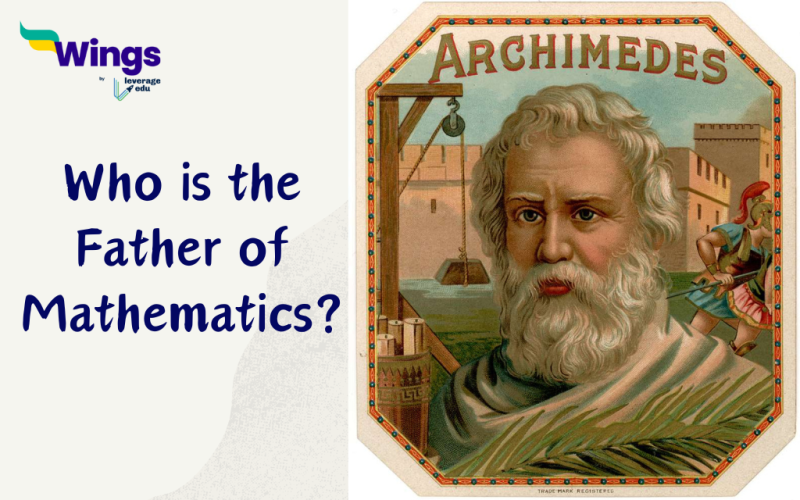The father of Mathematics is the philosopher and Greek mathematician Archimedes. Mathematics is one of the ancient concepts that developed since time immemorial. It consists of topics like numbers, figures, data, dimensions and logical processes. The influence of mathematics extends across various areas of our existence including healthcare, engineering, financial sectors, natural sciences, economics and beyond. Indeed, we live in a world deeply intertwined with mathematical principles. But do you know who is the father of mathematics? Let us answer the question further in detail.
toc]
Father of Mathematics – Archimedes
In simple terms, maths is the study of shapes, and amounts and figuring things out logically. The Greek mathematician Archimedes is known as the father of mathematics because of his contributions to the subjects and its concepts. One of his important contributions is also in physics, he developed a principle named “Archimedes Principle”. His revelation of the buoyancy principle, which he is well-known for demonstrating while bathing.
The buoyancy principle explains why some things float in water. When you put an object in a liquid, it feels an upward push equal to the weight of the water it pushes out of the way. The more water something pushes out, the more it floats! This Archimedes principle is widely used in engineering and physics today. His Law of floatation is used in everyday life.
| Archimedes Life Overview | |
| Birth | 287 BC |
| Birth Place | Syracuse, Sicily |
| Fields | Mathematics, Physics, Engineering, Astronomy, Mechanics |
| Contribution | Method Concerning Mechanical Theorems |
| Title | Father of Mathematics |
| Death | 212 BC |
Also Read – Who Is The Father Of Computer?
Who is Archimedes?
While details about Archimedes’s birth, family background, and early years are scant, he remains a renowned figure from ancient times.
- He was born in the year 287 BC, to a family of astronomers.
- His father, Phidias, was a renowned astronomer. He resided in Syracuse, a Greek city-state at the time.
- From a young age, Archimedes showed a keen interest in politics, mathematics, and sciences.
- His life was deeply engrossed in the study of mathematical formulas and the art of problem-solving.
- He was enrolled in the Egyptian School of Mathematics because of his interest.
- Archimedes died in 212 BC during the Siege of Syracuse.
Archimedes’ Contributions to Mathematics
Some of the important contributions of Archimedes in Mathematics were –
- Pi Derivation: Archimedes came up with a way to estimate pi, the ratio between a circle’s roundness (circumference) and its width (diameter). He got an answer close to 22/7, which is still used today for calculations.
- Measuring circles and spheres: Archimedes wrote a book called “On the Sphere” where he showed how to calculate the surface area of a ball and how much space it takes up inside a cylinder.
- The first one is – any shape with a radius r has a surface area that is four times bigger than the area of its biggest circle (in modern terms, S=4r2). The second one is – when a sphere fits perfectly inside a cylinder, the volume of the sphere is two-thirds of the volume of the cylinder. This leads to the equation for finding the volume of a sphere, V=(4/3)r3.
- Exponent Method for Big Numbers: In another book, “The Sand Reckoner,” Archimedes discusses his role in uncovering the exponent method and dealing with large numbers. To manage the powers of 10, he established the necessary guidelines and proved and illustrated the exponent law.
Another contribution of Archimedes can be seen in the fields of Engineering and Science. He is credited with creating the Archimedes Screw, a machine still employed today for water lifting. This ingenious device utilizes a rotating screw-shaped component within a tube, effectively lifting water from lower to higher areas. The Archimedes Screw is still used in irrigation systems and other applications.
Furthermore, Archimedes is associated with the development of a mirrored system, known as the “Death Ray,” which could theoretically focus sunlight and ignite ships at a distance. While the practicality of this invention is debated and may lean towards not reality, it underscores Archimedes’ fascination with optics and his innovative approach to applying scientific principles to solve real-world problems.
Also Read – Who is the Father of Modern Politics?
Discoveries By Archimedes
Because of his numerous achievements in mathematics and science, Archimedes is recognized as the pioneer of mathematics. He was working in the court of the King of Syracuse, Hiero II. Here are some of the discoveries made by Archimedes –
- Determining the circumference of a circle.
- The technique of exhaustion for determining the areas of various shapes.
- The connection between spheres and cylinders.
- Applications of prime numbers.
- The subject of infinity.
Also Read – Top 12 Famous Mathematicians of All Times
Interesting Facts about Archimedes
Here are some fascinating facts about Archimedes:
- Sir Isaac Newton and Carl Friedrich Gauss considered Archimedes to be among the most important and impactful mathematicians in history.
- The International Mathematical Union awards the Fields Medal, which is decorated with the image of Archimedes.
- He has been honoured with the names of an asteroid, a range of lunar mountains called Montes Archimedes and a crater.
- Eric Temple Bell, a renowned British writer, placed Archimedes among the top three mathematicians in human history.
Relevant Blogs
That is all about who is the father of mathematics. If you want to know more about topics like this, then visit our general knowledge page!
 One app for all your study abroad needs
One app for all your study abroad needs













